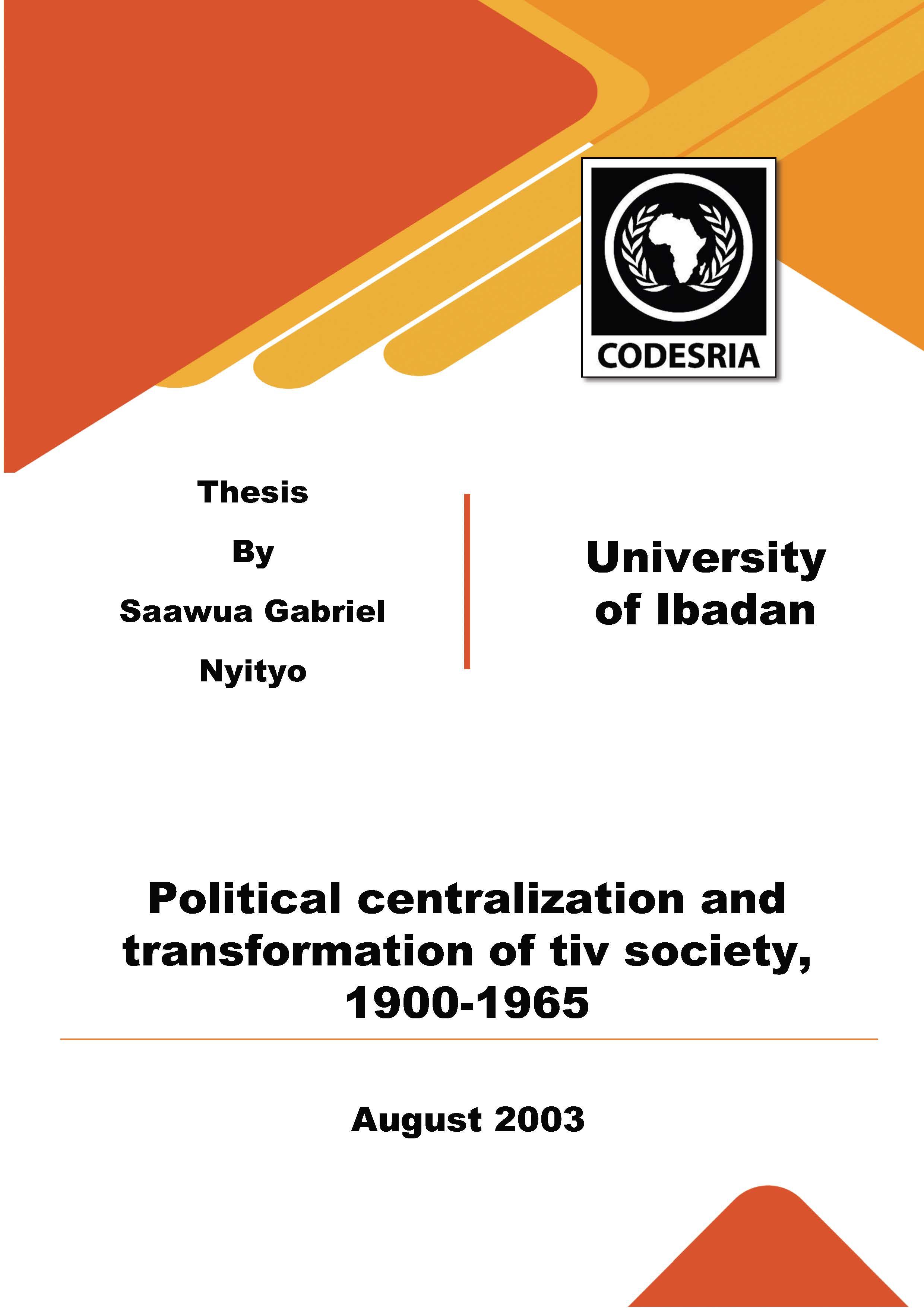Political centralization and transformation of Tiv society, 1900-1965
Mots-clés :
Political centralization, Tiv society, 1900-1965Synopsis
This study examines the factors that account for the transformation of a segmentary society into a centralized one during the period of British colonial administration in Nigerià. We do this by tracing, in detail, the options which the British had in trying to design a system of local administration for the Tiv, within the scope of their overall policy of Indirect Rule. The British instituted a centralized system of decision-making, but did not have their own staff to implement this through direct administration. Pre-colonial Tiv society on the other hand, did not easily produce cadres the British could use.
The British therefore appointed various individuals as district heads, based on their efficiency in keeping order and in the collection of taxes. The climax of these institutional reforms was the creation in 1946, of the office of the Tor Tiv (King of the Tiv). Thus, the resulting centralization transformed the whole of Tiv society economically, socially and politically. Old forms of authority were transformed and new sources of wealth and affluence created. New values, new institutions and new forms of societal contral were introduced.
The research methodology for the thesis involves extensive fieldwork and the collection of archiva! and oral data from various Tiv and non-Tiv communities. Archiva! material was consulted at Kaduna, Ibadan and Zaria. Study trips were also made to Benue, Plateau, Nasarawa and Taraba states. ln addition, archival documents in Keel University Library as well as the Public Records Office, London were consulted.
The study has demonstrated the adverse social consequences of over-concentration of authority at the centre or in the hands of a small group of social and political actors in a hitherto segmentary society. For example, the new leaders tightened their hold on Tiv society by adopting harsh and repressive measures against the population. The study concludes that the antagonistic relations between the various social actors eiders and youths, big men and common people and political groupings such as the Northern Peoples Congress (NPC) and the United Middle Belt Congress (UMBC) precipitated endemic
violence in Tivland during the immediate post-colonial period.
Téléchargements
Références
Amih, B.I. (1975): "The Role ofEx-servicemen in Tiv Society 1900-1947," Project ABU Zaria
Aminu, S. (1991): "The Colonial State and Colonial Economy in Northem Nigeria: A case study of Zaria Native Authority", M.A. Dissertation A.B.U. Zaria
Anongo, F.A. (1977): "Migration of Kunay area of Tivland in the Ninetheenth and Twentieth Centuries", Project, A.B.U. Zaria
Bako, J.V. (1975): "The Evolution ofKatshina-Ala Town 1907-1970, Project, A.B.U. Zaria.
Dzeremo, B. (1991): "Colonialism and the Transformation of Authority in Central Tivland 1900-1960," M.A. Dissertation, A.B.U. Zaria.
Gbasha, P.T. (1989): "Agriculture and Rural Society: A study of Colonial Agriculture Among the Tiv", M.A. Dissertation A.B.U. Zaria.
Gbor, J.W.T. (1974): "Traditions of Tiv origin and migrations with special emphasis on the Eastern Frontier to c. 1900, Project, A.B.U. Zaria.
Kpur-Kpur, A.I. (1976): "Slavery and Slave Trade in Tivland to the Advent of Colonization," Project, A.B.U. Zaria
Logmans, P.C. (1985): The Middle-Belt Movement in Nigerian Political Development: A Study in Political Identity 1949-1967, Vol. I & II Ph.d Kneekl Univ. United Kingdom.
Mohammed, A.M. (1985): "European Trading Companies and the Underdevelopment ofNorthern Nigeria 1855-1939: The Case of the Royal Niger Company/United Africa Company", Ph.d A.B.U. Zaria.
Orkar, N. (1970): "A Precolonial History of the Tiv, Central Nigeria 1500-1850, Ph.d Univ. ofDalhusie.
Tukur, M. (1979): The Imposition of British Colonial Domination on the Sokoto Caliphate, Borno and Neighbouring States: A Reinterpretation of Colonial Sources", Ph.d A.B.U. Zaria.
Ubah, C.N. (1973): "Administration of Kano Emirate under the British 1900-1930." Ph.d Univ. of Ibadan.






